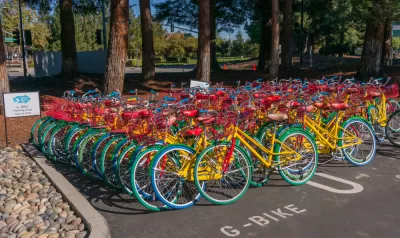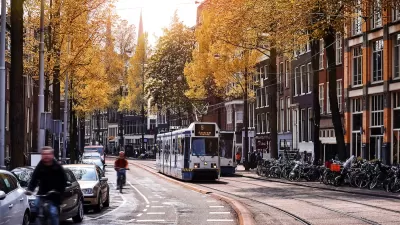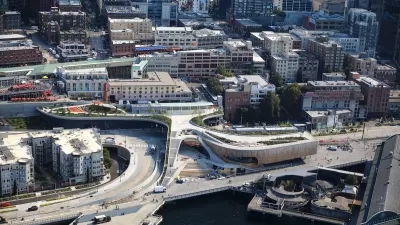This article considers the impacts of driverless cars, or autonomous vehicles, on bicycle planning and what a 'low stress' bicycle route may look like in the future.

There has been a lot of talk recently on the planning impacts of self driving cars, or autonomous vehicles as some call them. There is a recent CBC piece which summarizes many of the issues.
Although there are many planning issues surrounding self driving cars, for a moment I want to focus on bicycle planning. Here in Vancouver, creating cycle routes ‘for all ages and abilities’ has become a focus for Council. In order to do this, the focus has been on the creation of physically separated bike lanes. The design is intended to protect cyclists from the physical danger of vehicles. Or rather, the danger of people driving cars who are not paying as much attention as they should.
But an all seeing, all obeying computer driven car could presumably behave much better. It could be programmed to travel at, say, 20 kph on designed ‘low stress bicycle routes’ and be programmed to give people cycling the right of way. it could avoid certain streets altogether unless required to access a destination.
Instead of having to create separate spaces for different types of street-users because they are incompatible in some way, handing over control of vehicles to computers surely presents the opportunity for safe, low stress shared spaces. There are many planning advantages to this including narrower, more friendly feeling streets, making more efficient use of space.
We would of course have to trust the technology and this will not happen overnight. if you’re out cycling with your eight year old, do you really trust that Google powered autonomous vehicle to react in time when your child swerves out into its path?
We don’t know how the future will evolve. However, I believe it is important to start thinking through some of these scenarios so we’re better prepared as professionals and advocates when these questions and issues inevitably arise down the line.
FULL STORY: Impacts of self driving cars on bicycle planning

Planetizen Federal Action Tracker
A weekly monitor of how Trump’s orders and actions are impacting planners and planning in America.

Congressman Proposes Bill to Rename DC Metro “Trump Train”
The Make Autorail Great Again Act would withhold federal funding to the system until the Washington Metropolitan Area Transit Authority (WMATA), rebrands as the Washington Metropolitan Authority for Greater Access (WMAGA).

The Simple Legislative Tool Transforming Vacant Downtowns
In California, Michigan and Georgia, an easy win is bringing dollars — and delight — back to city centers.

The States Losing Rural Delivery Rooms at an Alarming Pace
In some states, as few as 9% of rural hospitals still deliver babies. As a result, rising pre-term births, no adequate pre-term care and "harrowing" close calls are a growing reality.

The Small South Asian Republic Going all in on EVs
Thanks to one simple policy change less than five years ago, 65% of new cars in this Himalayan country are now electric.

DC Backpedals on Bike Lane Protection, Swaps Barriers for Paint
Citing aesthetic concerns, the city is removing the concrete barriers and flexposts that once separated Arizona Avenue cyclists from motor vehicles.
Urban Design for Planners 1: Software Tools
This six-course series explores essential urban design concepts using open source software and equips planners with the tools they need to participate fully in the urban design process.
Planning for Universal Design
Learn the tools for implementing Universal Design in planning regulations.
Smith Gee Studio
City of Charlotte
City of Camden Redevelopment Agency
City of Astoria
Transportation Research & Education Center (TREC) at Portland State University
US High Speed Rail Association
City of Camden Redevelopment Agency
Municipality of Princeton (NJ)





























